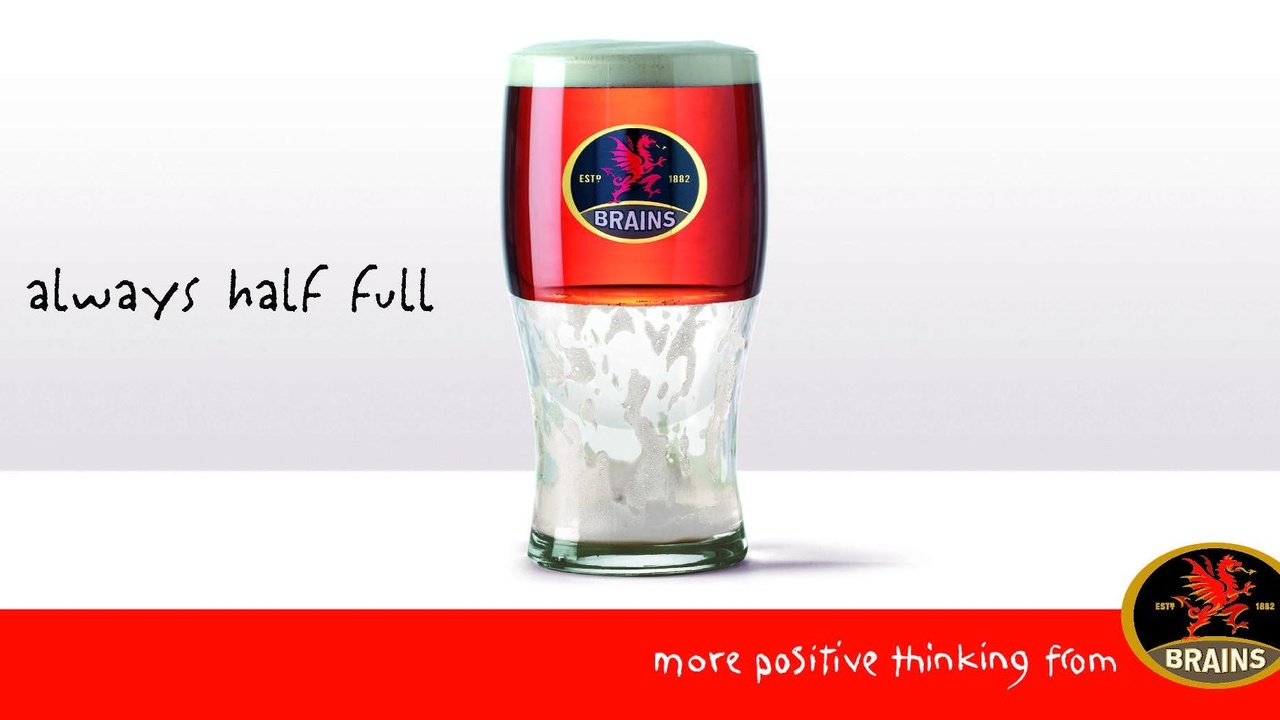When Self Confidence Is Low
Apr 08, 2021
When self confidence is low it can be hard to see the good in anything. Although this is blog is not sponsored, Brains SA is my favourite pint. Read on for some ideas on how to get your glass at least half full.
The thinking behind low self confidence
There is a process called Transactional Analysis which includes the thought, "I'm okay, you're okay." This was also the title of the 1967 self-help book by Thomas Anthony Harris.
Essentially, the process illustrates the mess we can create in our lives when we don't think right, about others or ourselves. The issues with others can range from simple misunderstandings through to outright conflict.
It's the issues we create for ourselves I am more interested in today, though.
The Issues To Recognise
Thinking "I'm Not Okay" can underpin a whole range of issues, including:
- People take advantage of us
- We don’t feel great about ourselves
- We can become Passive Aggressive
- We get frustrated
- We are suspicious of the motives of others
- We can feel stuck
- Demotivation to do anything can kick in
- Our self confidence can be shattered.
When self confidence is low and we think we're not okay, it's time to bring in a quote and switch into some higher levels of thinking.
"I am me, nothing more, nothing less, and that is enough"
Rebuilding Self Confidence

1 - List of Achievements
This may not be something you've thought about much. Write down everything you've ever achieved.
These will range from seemingly insignificant things like a Gold Star from a teacher through to significant events such as raising thousands of pounds when you completed a marathon.
Whatever it is, write it down.
2 - List of Talents
What are you uniquely qualified to do? What are you great at? What do your friends and family rely on you for?
Is it a fantastic recipe or an ability to solve a tough crossword? Are you fluent in another language or can you remember obscure facts from your childhood? Do you love to sing? Are you a peacemaker? Do you always volunteer to help?
Write down anything and everything.
Having two lists like these act as evidence of you can do things and you can feel at least a little bit confident in your abilities.
3 - "You're Goal if you ain't got a Goal is to get a Goal"
It's a common misconception that all goals have to be achieved. That's not why goals are good for us. In fact, persisting with a goal, long after it has any practical use in our lives, can be quite harmful.
It's what goals do for us in the setting of them, and the process of achieving them, that really makes a difference.
By setting a goal to do anything, we give ourselves permission to think beyond our current circumstances and see something better, something to strive for.
4 - Talk Yourself Up
Listen to yourself for a whole week. Watch out particularly for phrases like;
- "I'm not very good at this."
- "She/he is so much better at this than me.
- "I can't do that."
- "I wouldn't know where to start."
Constantly putting ourselves down has serious affects on our self confidence, so instead try this simple technique. Reframe - when you hear yourself say something disempowering, change your words to provide some impetus to do something just slightly out of your comfort zone. Something like:
- "I'd love to give it a go."
- "I've not tried this for ages, it could be fun."
- "She/he has inspired me. Let me try."
5 - Start a Hobby
The last tool in this particular Repair Kit I'm going to suggest is to do something that doesn't stimulate thoughts of accomplishment and is of value in and of itself. Hobbies require focus and concentration. Sometimes they deliver a tangible output. Sometimes they can enable us to forget everything else and just absorb our attention. Sometimes they can shift our emotions and lift our spirits.
A simple stimulus like this can be all it takes to provide a small boost to our confidence and get things moving in the right direction.
Using your Self Confidence Repair Kit
- Lists of achievements and talents will remind you, in your darker moments of self doubt and low self confidence, that you are worthy. You have a vital role to play. You are good enough.
- A goal can shift your perspective and help you focus on who you are becoming.
- Only saying words that empower us is an act of self love. It's the equivalent of being there for our best friend. (For more on this topic, here's a blog I wrote a few weeks ago.)
- Hobbies are an important investment of your time. They are a reminder of the value in just being. You are important.
If you like watching videos, here's a link to my latest video on this very topic.
By the way: If you've enjoyed this ramble around the topic of self confidence, you'd love my TCM Community. It's a place dedicated to personal development for the professional. Right now you can try it out for just £1. Find out more here.


